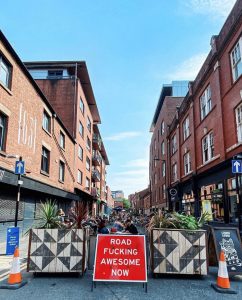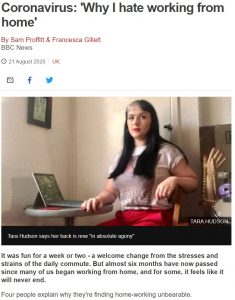It doesn’t matter if the glass is half full or half empty. There’s water in the glass.
Do you remember the loo roll shortage, with regular scenes on the news of people scrambling around supermarkets and impulse bulk buying pasta, loo roll and bread? It doesn’t seem to be happening now.

Do you remember the scrutinised ‘up to one hour of exercise per day’ that we were restricted to? That has now gone away.
Do you remember the full lockdown, with key workers having to carry around documentation to show to authorities if questioned, that they were a key worker going to work and that was the reason for them being out of the house? The lockdown is localised now and is generally reducing across parts of the UK.
At the time, the above scenarios seemed like they would continue and it was difficult to see a way forward. It still is unclear and a global pandemic will undoubtedly bring with it some challenges, with more to come. It is obvious though that there is a way forward, and through experience the politicians and businesses can learn from this and become more resilient.
A number of my peers in the industry remain on furlough and this is difficult. We look forward to meeting again very soon as the property industry is a people industry, and we all need each other. A safe social event is certainly on the cards as soon as we are able to pencil something in to the diary! There will be possible hardship come the 31st October and beyond, when the government furlough scheme comes to a probable end, but there will also be opportunity.
Some people have discussed, ‘where will people go if there are no jobs to go to’, which is a valid question although at this stage a little overzealous in my opinion. You could argue however, that with the remote working that people have been forced in to, this allows people in the North to access job roles that would generally be based in the South, East and West, so new roles could be created.
Q. Why are fund managers generally based in London, and also Edinburgh? A. London has been the financial hub and a major trade centre since the Middle Ages. So, if people are now working remotely for say, 3 days out of 5 (an example), then why could a fund manager not be based in the North West but working for say, Aviva, L&G, Aberdeen Standard Investments? This way they could be more proactive in terms of managing assets within that particular region? This is just an example of what could be borne out of the global pandemic, but may not come to fruition of course. It could create opportunity.
There will be things that have been adapted and will change now, that will no doubt become the new normal, although not everything taking place now will be ‘the new normal’. This quote is overplayed in my opinion, similar to the unprecedented use of the word ‘unprecedented’. A lot of people on New Year’s Eve want to create the ‘new normal’, but it generally fizzles out by February. There will be things that people do differently going forward and it will create a new normal in certain circumstances, but this should be a positive as anything that does become ‘the new normal’ will generally be making systems more efficient (people hopefully not sitting in a car for over 2 hours to drive in and out for work, colleagues taking a 2 hour train journey to meet with colleagues for an update), or places more attractive to be in (encouragement of more public open spaces, better design input for high rise apartment schemes in densely populated areas to create amenity space). Not everything will be the new normal though, so quiet coffee shops shouldn’t remain as quiet coffee shops. Empty office buildings will not stay as empty office buildings. Empty train carriages should soon start to fill up.

Some people have discussed, ‘is the office dead’, which gives rise to a healthy debate and there is no outright answer – as it is subjective and also will differ from business to business and sector to sector. I personally believe that the office is alive and well. Is this because I want to protect real estate and my clients? No. It’s because I think the pessimism around the sector and the pandemic is temporary. Yes, there’ll be a cultural shift in some workplaces, but demand for offices will remain.
Additional space will be required (if not provided already) for wellness areas, break out space, online conference facilities etc.
What people haven’t been factoring in is costs to set up an employee at home and also the employer liability and future litigation.

There’s the argument for trainees and graduates. How do you learn from colleagues when not in the office? I have heard the stories about graduates living in city centre flats battling with fellow flat mates across a breakfast bar ‘desk’ to try and secure the best of the shared WiFi. The remote working for trainees and graduates has today resulted in CBRE, Colliers and JLL deferring their graduate programmes due to Covid-19 until “early 2021”, whilst Savills will move to a virtual scheme later this month. This was announced in the Property Week and it is detrimental for firms in terms of fresh new intakes providing energy and enthusiasm. It is however, only temporary, and is a wise decision by each firm as it is unfair to allow a new starter to be welcomed in to the property world virtually – even in 2020. It is also ironically timed though, with the Kickstart Scheme government initiative of getting young people back in to work.
I think the office debate is to be settled by the employer and not the real estate asset. The employer must decide on what the working patterns will be or will remain, and how they wish to invest in employees to work from home (non-desktop equipment, fully secured internet, mobile telephone, ergonomic seating, health and safety policies, remote server, zoom etc business accounts). It is down to the more rigid, traditional industries or practices to become more ‘2020’ and embrace flexibility of the workplace. Some of this has already been happening widespread across creative and technology businesses, with innovation at the forefront, for a number of years now.
On a webinar yesterday, William Dowson, agent at the Bank of England suggested that the UK has moved forward in digital take up by 10 years in just 6 months. This is a positive, surely.
William Dowson did go on to say that the dash for cash in March has since been relaxed following government quantitative measures, and that the economy should balance out by 2022, with the commercial real estate market being robustly stress tested which provides them with confidence. The Bank of England is “not out of firepower” if it is needed to offer further support to the coronavirus-battered economy. We will see what transpires in the months ahead and post rental payment quarter dates.
The commercial real estate investment market has unsurprisingly suffered since Q1 2020. The first quarter of 2020 was a positive start of the year however, the Boris Bounce was short lived and we are now on the Rishi Rise hopefully (quantitatively) easing out in to Q4 2020.

In brief for Q3 2020 (to date), over £3bn of commercial real estate has transacted so far in Q3 2020, across 207 transactions, reflecting a weighted average yield of 4.96%. The figures are down by roughly 68% from 2019. Interestingly, in the top 10 investment transaction lot sizes, there are 5 office assets (top 3 value were offices) and 2 retail assets. The highest transaction value to date in Q3 is a £380m office acquisition of 25 Cabot Square in London, acquired by Link REIT (Hong Kong) at a 4.70% in July 2020. This asset is leased to multiple tenants including Morgan Stanley, providing a 10.9 year WAULT. This is not viewed as a residential conversion opportunity in the short to medium term (given the unexpired term), so there is an obvious belief in the office sector. Other offices to transact so far in Q3 include 1 New Oxford Street, London (£174m / 4.20% NIY), 1-3 Lochside Crescent, Edinburgh (£133.25m) and Bourne Business Park, Addlestone (£76.7m). The retail assets featured in the top 10 highest value transactions to date include Broadwalk Shopping Centre in Edgware (£75m) and a portfolio of six Waitrose supermarkets (£74.1m / 4.40% NIY).
Surely this is a positive for the office sector, that high value assets are trading in Q3 2020?
Do you remember when Twitter and Fujitsu said to staff that they can continue working from home permanently? While other organisations plan to work from home in the short to medium term, Amazon is expanding its offices across the US, announcing that it will expand it 6 of its US Tech Hubs. The E-commerce giant plans to create 3,500 new tech and corporate jobs across the US and it will invest $1.4bn in its new offices, which will host teams supporting businesses across the company. Will others follow suit in this brave move by Amazon?
There is an argument that for some businesses an office is unnecessary, and that will be the case. Some offices will reduce in capacity, for sure. Offices can add value to a business, particularly the value of a business to be acquired for example. Offices are adaptable assets and they offer conversion and re-configuration potential, so landlords can look to create flexible working if required and can open up floor plates for open plan working if required. Lower floors can be changed for alternative uses (leisure, retail, residential) and so too can the top floors of assets where they have an attractive view or outlook. The fundamentals of an office building can create numerous opportunities.
Retail is continuing to transition and it is unknown where the high street will be in 5 years time, from a retail and consumer perspective. In many villages and towns some of the general A1 retail units are becoming F&B orientated uses or service led businesses. Experience is a key going forward for retail, in terms of what the consumer gets from visiting the store/shopping centre. I believe that local retail is still in demand, and now in vogue following the pandemic. High street retail specialists can comment further, however, I do believe that similar to the office, that the high street is not dead. It just requires time to adapt, improvise and overcome the challenges. Retail and the high street is most often found in central, higher value locations – which creates an opportunity.

Retail warehousing has had a better lockdown than other parts of the UK retail hierarchy. More stores have remained open due to selling essential goods. Retailer’s margins have been supported by the business rates holiday and generally forgiving attitudes by some landlords towards rent holidays and re-gearing leases. The social distancing friendly nature of retail warehouse parks and schemes should support a quicker recovery to normal trading levels than in some other parts of retail. Occupiers such as B&Q, B&M Retail and the supermarkets have traded comparatively well over the last two quarters, and the resilient nature of the ‘essential’ business provide attractive characteristics as an investment opportunity. Retail warehousing generally has good fundamentals to convert to industrial last mile logistics or a trade counter sub-division scheme. This creates an exciting opportunity, at a yield discount to pure industrial assets.
Industrial is industrial and continues to grab the headlines in the occupier and investment markets. The industrial sector is performing well and the rise of e-commerce has been exacerbated during the global pandemic. E-commerce is not going to go away, and following Brexit the possibility of more manufacturing processes, nearshoring, will have a positive effect on the demand for industrial accommodation in parts of the UK.

A British Property Federation report revealed in 2019 that there is presently 69 sq ft of warehouse floor space for every home in England. If this relationship were to continue this would mean 21 million sq ft of additional warehouse floor space is required each year, to match the Government’s annual target of 300,000 new homes. This will provide opportunity now and over the years ahead for the already buoyant industrial sector.
The ‘Planning for the Future’ government report aims to speed up planning approval for developments, which the prime minister has described as “unlike anything we have seen since the second world war”. This will no doubt shape the future of the high streets in England and will also act as a stimulus for further new development. This will no doubt create opportunities.
I think that H2 2020 will continue to be a testing time for business, although in terms of commercial real estate investment there should be an uptick in activity given that the furlough scheme comes to an end and more people return to work. Stalled investment sales should drip through to the market in Q4 2020 and any paused transactions could regain momentum through to completions. The year has been difficult to date, but it is imperative to keep looking forward but be mindful of the current situation.
Wildbrook Commercial Real Estate was incorporated in March 2018, so following Brexit and a global pandemic, I am hopeful that 2021 will be a less confusing year. We have assets under offer and are building on an existing pipeline of opportunities, working closely with our clients.
2021 can be a positive year and can be economically boosted by the Euro 2021 football championships and Rugby League World Cup 2021, both being held in England in part or as a whole. Holidays may be less risky and more bookable, and MIPIM could be back on the agenda (an empty Caffe Roma is not ‘the new normal’). The rise of the ‘staycation’ should boost the UK economy and I will try to do my bit later this month down on the South Coast.

Do you remember my previous blogs where I updated readers during lockdown, with the cost of a pineapple at the local farm shop (£5.00!) and broccoli at the local SPAR (£1.30 per head)? Well, last night I walked by a neighbours house where they were offering cooking apples for free, due to a “windfall in their garden”. Free apples – this is a positive, and this provides an opportunity.

Wildbrook continue to physically occupy our office in Manchester, so if you want to meet for a cup of tea just drop us a line. Alternatively, an online meeting can of course be arranged.
Stay safe,
Neil Higson – Investment Director.


